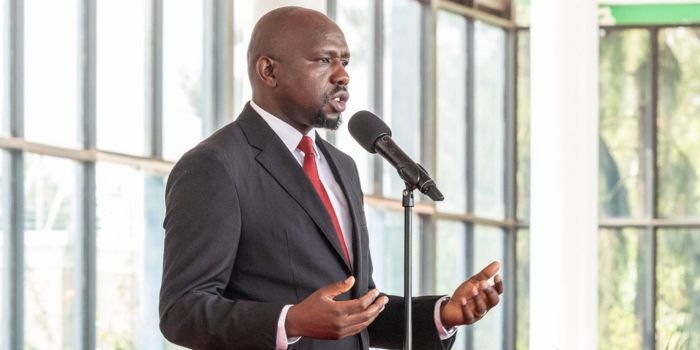Interior Cabinet Secretary Kipchumba Murkomen has announced a series of reforms aimed at fixing the broken relationship between Kenyan citizens and the police.
Speaking during a press briefing on Wednesday evening, Murkomen highlighted that his ministry is rolling out several key changes designed to rebuild public confidence in law enforcement.
Improved Police Training
Murkomen began by emphasizing the need for continuous police training — a major gap in the current system where officers rarely undergo further learning after graduating from Kiganjo Police Training College.
According to him, the government is now planning to introduce regular refresher courses focused on building better relationships between police officers and the general public.
These trainings will cover human rights, ethical behavior, and proper community engagement.
Digital Occurrence Books for Accountability
To increase transparency and reduce misconduct, Murkomen revealed plans to expand the use of digital occurrence books (OBs).
These digital records will make it easier for police officers to be held accountable not just by their immediate supervisors but also by higher-level command structures across the country. With OBs accessible through a central system, cases of cover-ups and missing reports are expected to drop drastically.
CCTV Installation in Police Stations
Another major step is the mandatory installation of CCTV cameras in all police stations. Murkomen said he had already issued the directive in June, and the rollout is ongoing. These surveillance systems will help monitor how officers treat citizens who walk into police stations, while also providing evidence in case of misconduct or abuse.
Minimizing Contact Between Police and Motorists
Addressing one of the most common sources of friction — traffic stops — Murkomen announced a partnership with the National Transport and Safety Authority (NTSA) to place surveillance cameras on major highways.
These cameras will monitor traffic violations in real time, reducing the need for physical interactions between drivers and police officers, which are often tainted by bribery and harassment.
“In Nairobi, we’ve already begun implementing an Intelligent Traffic System in collaboration with our partners from China and South Korea,” Murkomen said. “This will automate traffic control and ensure police involvement is kept to a minimum, boosting both efficiency and accountability.”
Reward System for Outstanding Police Officers
To motivate better conduct, the Ministry is also introducing a new incentive program where police officers who go above and beyond their duties will receive recognition and rewards. Murkomen believes this approach will help shift the internal culture of the police force and encourage officers to serve with dignity and professionalism.
Citizens Must Also Take Responsibility
While the reforms are focused on fixing the institution, Murkomen stressed that meaningful change cannot come from the government alone. He called on Kenyans to also do their part in fighting corruption.
“We can’t reform the police if citizens continue to pay bribes or encourage corrupt practices,” he said. “It takes two to tangle. If we want a better police force, then we, the people, must stop participating in the system’s decay.”
Ongoing Tension Between Police and Citizens
Tensions between the public and the police have remained high, especially after recent nationwide protests where officers were accused of using excessive force, unlawful arrests, and being involved in disappearances. These incidents have left many Kenyans feeling unsafe around those meant to protect them.
Murkomen acknowledged these challenges, saying the ongoing reforms aim to address both the perception and the reality of police misconduct. He reiterated that restoring trust will take time but assured the public that the government is committed to meaningful change.
Join Gen Z New WhatsApp Channel To Stay Updated On time https://whatsapp.com/channel/0029VaWT5gSGufImU8R0DO30


